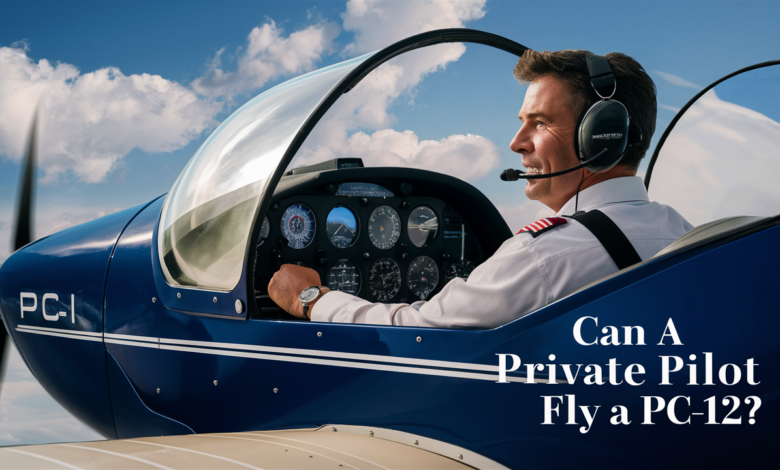Can A Private Pilot Fly A PC-12?

The single-engine turboprop – Pilatus PC-12 – is famous for its solid performance and ability to handle a wide range of missions, from business trips to medical evacuations and more. Its roomy cabin, impressive range, and capability to take off and land on short, unpaved runways make it a top choice for both private pilots and charter companies.
The PC-12 is not just about practicality; it also offers advanced avionics and a powerful engine, giving pilots a perfect mix of comfort and efficiency. But with all its sophisticated systems and high-performance features, one big question often comes up: Can a private pilot actually fly a PC-12?
Everything A Private Pilot Needs To Fly A Pilatus PC-12 (Jet Card Or Not)
Private Pilot License (PPL) Requirements
To fly a Pilatus PC-12, a pilot must first hold a Private Pilot License (PPL). Obtaining a PPL involves several steps:
- Ground School: Completing ground school to learn the theoretical aspects of flying.
- Flight Training: Logging a minimum of 40 flight hours, including 20 hours of flight instruction and 10 hours of solo flight.
- Written Exam: Passing the FAA written exam.
- Practical Test: Completing the FAA examiner.
While a PPL allows a pilot to fly single-engine aircraft under Visual Flight Rules (VFR), flying a PC-12 requires additional training and certification.
Read More Articles: How Do I Charter A Private Plane?
Additional Certifications and Training
The Pilatus PC-12, classified as a high-performance aircraft due to its powerful engine, necessitates additional endorsements and ratings beyond the basic PPL:
- High-Performance Endorsement: Required for any aircraft with an engine of more than 200 horsepower. The PC-12’s Pratt & Whitney PT6A engine easily meets this criterion.
- Complex Endorsement: Although not mandatory for the PC-12, it’s beneficial as the aircraft has retractable landing gear and flaps.
- Instrument Rating (IR): Given the PC-12’s advanced avionics and potential for long-range flights, an instrument rating is highly recommended. This allows pilots to fly under Instrument Flight Rules (IFR), essential for navigating through clouds and poor weather conditions.
- Type Rating: For aircraft over 12,500 pounds, a type rating is necessary. While the PC-12 is under this weight limit, some operators may require a type rating due to the aircraft’s complexity.
Specific Training for the Pilatus PC-12
Even with the necessary endorsements, specific training on the Pilatus PC-12 is crucial. This training includes:
Aircraft Systems
Understanding the PC-12’s systems is fundamental. The Pilatus PC-12 is equipped with an advanced avionics suite that includes the Honeywell Primus Apex integrated flight deck, which provides pilots with sophisticated tools for navigation, communication, and aircraft management. Pilots must become proficient in using these avionics, which involves learning to operate the flight management system, autopilot, and electronic flight instrumentation system (EFIS). Additionally, comprehensive knowledge of the engine management system is essential. The PC-12 is powered by the Pratt & Whitney PT6A engine, and understanding its operation, performance parameters, and emergency procedures is critical. Pilots must also be familiar with the aircraft’s electrical, hydraulic, and fuel systems. They need to know they can manage these systems effectively during both normal and emergencies.
Simulator Training
High-fidelity flight simulators replicate the aircraft’s handling characteristics and avionics, allowing pilots to practice and refine their skills in a controlled environment. This training covers various scenarios, including normal flight operations, instrument flight procedures, and emergencies such as engine failures, electrical malfunctions, and adverse weather conditions. By simulating these conditions, pilots can gain valuable experience and build confidence without the risks associated with real-flight training. Many training centers offer specific courses for the Pilatus PC-12, providing a comprehensive curriculum that addresses all aspects of the aircraft’s operation.
Flight Training
Hands-on flight training is the final and most crucial part. This involves actual flight time in the Pilatus PC 12 (jet card probably not needed here) with a certified flight instructor (CFI) who is experienced in the aircraft. During this phase, pilots practice takeoffs, landings, and various in-flight maneuvers. They also learn how to handle the aircraft in different phases of flight, from climb-out to cruise, descent, and landing. Instructors guide managing the aircraft’s systems in real time.
Advantages of Using a Pilatus Jet Card
For pilots who may not want to own a PC-12 outright, a Pilatus jet card offers a flexible and cost-effective alternative. Here are some benefits:
Cost Savings
One of the most significant advantages of a Pilatus jet card is the cost savings. Owning an aircraft like the Pilatus PC-12 involves substantial expenses, including purchase costs, hangar fees, maintenance, insurance, and crew salaries. With a Pilatus jet card, you can avoid these high costs. Instead of dealing with the financial burden of ownership, you pay only for the flight hours you use.
Flexibility
A Pilatus PC 12 jet card provides unparalleled flexibility. You gain access to the aircraft without the long-term commitment of ownership. This flexibility allows you to fly as much or as little as you need, adjusting your flying schedule based on your personal or business requirements. You can also choose different aircraft within the fleet, depending on your needs for a particular trip.
Convenience
The booking process is simplified, allowing you to arrange flights with minimal hassle. With a Pilatus PC-12 jet card, you can bypass the complexities of aircraft management, maintenance scheduling, and regulatory compliance, as these are handled by the service provider. This streamlined process saves time and effort, enabling you to focus on your travel plans without the stress of aircraft logistics. Additionally, many jet card programs offer concierge services, assisting with everything from flight planning to ground transportation, further enhancing the convenience factor.
Read More Articles: What are the Three Types of Smart Cards?
Talk To The Professionals
The PC-12 is a remarkable aircraft, offering a unique combination of performance, versatility, and comfort. For those who prefer not to own the aircraft, the Pilatus jet card provides excellent alternatives.
For more information on training, and jet card options, or to schedule a consultation, contact the LIVT Life team today. Let us help you take the next step in your aviation journey with the Pilatus PC-12.



